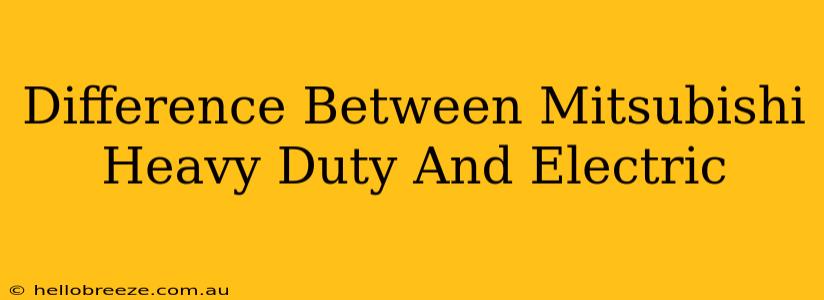Choosing the right forklift for your business is crucial for efficiency and safety. Mitsubishi offers both heavy-duty internal combustion forklifts and electric forklifts, each with its own strengths and weaknesses. This comprehensive guide breaks down the key differences to help you make an informed decision.
Power Source: The Core Difference
The most fundamental difference lies in their power source. Mitsubishi heavy-duty forklifts are powered by internal combustion engines (ICE), typically gasoline, LPG (propane), or diesel. Mitsubishi electric forklifts, on the other hand, run on rechargeable batteries. This core distinction impacts various operational aspects, including:
Fueling and Recharging:
- Heavy-Duty (ICE): Requires regular refueling with gasoline, LPG, or diesel. Refueling time is relatively quick, allowing for minimal downtime. However, fuel costs can be significant, and emissions are a concern.
- Electric: Requires regular charging. Charging times vary depending on the battery type and charger, ranging from a few hours to overnight. However, operating costs are generally lower due to cheaper electricity compared to fuel. Furthermore, electric forklifts produce zero tailpipe emissions, contributing to a cleaner work environment.
Performance and Applications:
- Heavy-Duty (ICE): Generally offer higher power and lifting capacity, making them ideal for heavy-duty applications, outdoor work, and situations requiring extended operation without recharging or refueling. They typically handle larger loads and operate across diverse terrains.
- Electric: Offer quiet operation and maneuverability, making them suitable for indoor applications, warehouses, and environments sensitive to noise and emissions. While lifting capacity is increasing, they may not match the power of heavy-duty ICE forklifts in all scenarios.
Maintenance and Operating Costs:
- Heavy-Duty (ICE): Require more frequent maintenance due to the complexity of the engine and associated components. Repair costs can be higher, and regular oil changes and filter replacements are necessary. Fuel costs also contribute significantly to the overall operating expenses.
- Electric: Generally have lower maintenance costs. Battery replacement is a major expense, but overall, fewer moving parts translate to reduced maintenance frequency and cost. Electricity is generally cheaper than fuel, further reducing operating expenses.
Environmental Impact:
- Heavy-Duty (ICE): Produce exhaust emissions contributing to air pollution. The environmental impact varies based on fuel type and engine technology, but it remains a key factor to consider.
- Electric: Produce zero tailpipe emissions, making them an environmentally friendly option. However, the manufacturing process and battery disposal do have environmental implications which should be considered.
Choosing the Right Mitsubishi Forklift: Key Considerations
The best choice between a Mitsubishi heavy-duty and electric forklift depends on your specific needs and operational requirements. Consider the following factors:
- Workload: How much weight will you be lifting regularly?
- Operating Environment: Will the forklift be used indoors or outdoors? What is the terrain like?
- Budget: What is your budget for initial purchase and ongoing operating costs?
- Environmental Concerns: How important is minimizing environmental impact?
- Noise Levels: Are noise levels a concern in your workplace?
By carefully evaluating these aspects, you can select the Mitsubishi forklift that best fits your application and contributes to the efficiency and success of your operation. Consulting with a Mitsubishi forklift dealer can provide valuable guidance and help tailor the selection process to your individual needs.

